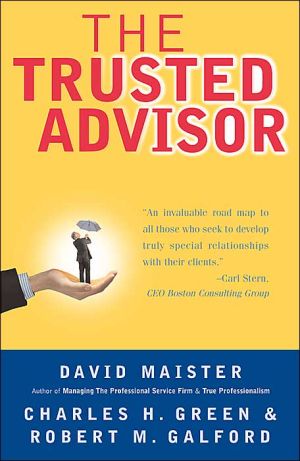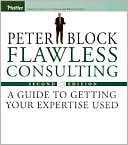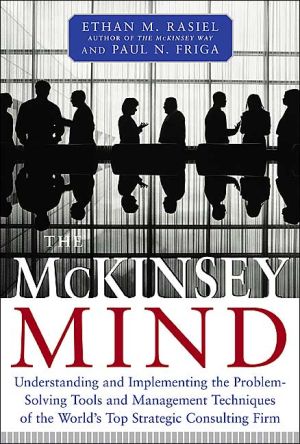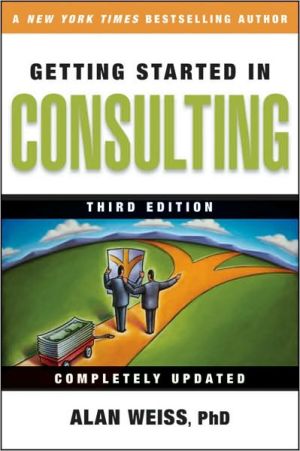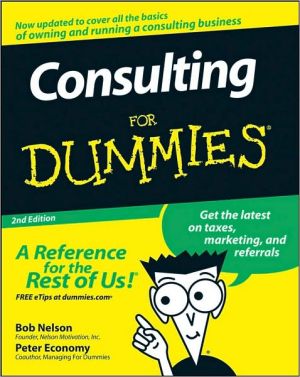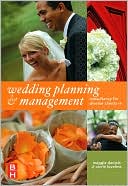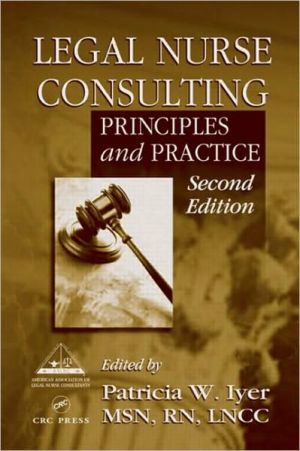The Trusted Advisor
In today's fast-paced networked economy, professionals must work harder than ever to maintain and improve their business skills and knowledge. But technical mastery of one's discipline is not enough, assert world-renowned professional advisors David H. Maister, Charles H. Green, and Robert M. Galford. The key to professional success, they argue, is the ability to earn the trust and confidence of clients. To demonstrate the paramount importance of trust, the authors use anecdotes,...
Search in google:
In today's fast-paced networked economy, professionals must work harder than ever to maintain and improve their business skills and knowledge. But technical mastery of your discipline is not enough, assert world-renowned professional advisors David H. Maister, Charles H. Green, and Robert M. Galford. The key to professional success, they argue, is the ability to earn the trust and confidence of clients. The creation of trust is what earns the right to influence clients; trust is also at the root of client satisfaction and loyalty. The workings of trust are even more critical in the new economy than in the old. Maister, Green, and Galford enrich our understanding of trust -- yet they have also written a deeply practical book. Using their model of "The Trust Equation," they dissect the rational and emotional components of trustworthiness. With precision and clarity, they detail five distinct steps you must take to create a trust-based relationship. Each step -- engage, listen, frame, envision, and commit -- is richly described in distinct chapters. The book is peppered with pragmatic "top ten" lists aimed at improving advisors' effectiveness that can be put to use instantly. It also includes a trust self-diagnostic in the appendix. This immensely readable book will be welcomed by the inexperienced advisor and the most seasoned expert alike. The authors use anecdotes, experiences, and examples -- successes and mistakes, their own and others' -- to great effect. Though they use the professional services advisor/client paradigm throughout the book, their prescriptions have resonance for other trust-reliant situations -- selling, customer relationship management, and internal staff functions like HR and information technology. The result is a tour de force -- brilliant, penetrating, unique. It is essential reading for anyone who must advise, negotiate, or manage complex relationships with others.
\ Chapter 1: A Sneak Preview\ Let's start with a question: What benefits would you obtain if your clients trusted you more?\ Here's our list. The more your clients trust you, the more they will:\ \ Reach for your advice\ Be inclined to accept and act on your recommendations\ Bring you in on more advanced, complex, strategic issues\ Treat you as you wish to be treated\ Respect you\ Share more information that helps you to help them, and improves the quality of the service you provide\ Pay your bills without question\ Refer you to their friends and business acquaintances\ Lower the level of stress in your interactions\ Give you the benefit of the doubt\ Forgive you when you make a mistake\ Protect you when you need it (even from their own organization)\ Warn you of dangers that you might avoid\ Be comfortable and allow you to be comfortable\ Involve you early on when their issues begin to form, rather than later in the process (or maybe even call you first!)\ Trust your instincts and judgments (including those about other people such as your colleagues and theirs)\ \ We would all like to have such professional relationships! This book is about what you must do to obtain these benefits.\ What changes would you make to this list? What would you add? Delete?\ Next, let's consider three additional questions:\ Do you have a trusted advisor, someone you turn to regularly to advise you on all your most important business, career, and perhaps even personal decisions?\ If you do, what are the characteristics of that person?\ If you do not, what characteristics would you look for in selecting your trusted advisor?\ Here is a listing of traits that our trusted advisors have in common. They:\ \ Seem to understand us, effortlessly, and like us\ Are consistent (we can depend on them)\ Always help us see things from fresh perspectives\ Don't try to force things on us\ Help us think things through (it's our decision)\ Don't substitute their judgment for ours\ Don't panic or get overemotional (they stay calm)\ Help us think and separate our logic from our emotion\ Criticize and correct us gently, lovingly\ Don't pull their punches (we can rely on them to tell us the truth)\ Are in it for the long haul (the relationship is more important than the current issue)\ Give us reasoning (to help us think), not just their conclusions\ Give us options, increase our understanding of those options, give us their recommendation, and let us choose\ Challenge our assumptions (help us uncover the false assumptions we've been working under)\ Make us feel comfortable and casual personally (but they take the issues seriously)\ Act like a real person, not someone in a role\ Are reliably on our side and always seem to have our interests at heart\ Remember everything we ever said (without notes)\ Are always honorable (they don't gossip about others, and we trust their values)\ Help us put our issues in context, often through the use of metaphors, stories, and anecdotes (few problems are completely unique)\ Have a sense of humor to diffuse (our) tension in tough situations\ Are smart (sometimes in ways we're not)\ \ What would you add to (or delete from) this list?\ Using the Golden Rule (we should treat others as we wish to be treated), we can probably make a fair assumption (or at least a good first approximation) that this list, or your list, is not much different from a list your clients would make.\ So, if you want your clients to treat you as their trusted advisor, then you must meet as many of the "tests" on this list as possible.\ Ask yourself: Which of these traits do my clients think I possess? (Not what you think you possess, but what they think you do!) If you suspect that you might not demonstrate all these traits, then how do you get better at each of them? That's what this book will try to answer.\ Note that this book is not (just) about the wonderful benefits that wait at the end of the rainbow for the full-fledged trusted advisor, who does (or is) everything listed here. The early benefits of beginning to earn trust are substantial and can be obtained quickly. The ability to earn trust is a learnable skill, and we shall try in the succeeding pages to show "the yellow brick road" that leads to success.\ Copyright © 2000 by David H. Maister, Charles H. Green, and Robert M. Galford
IntroductionHow to Use This BookPart One: Perspectives on Trust1. A Sneak PreviewWhat would be the benefits if your clients trusted you more?What are the primary characteristics of a trusted advisor?2. What Is a Trusted Advisor?What do great trusted advisors all seem to do?3. Earning TrustWhat are the dynamics of trusting and being trusted?4. How to Give AdviceHow do you ensure your advice is listened to?5. The Rules of Romance: Relationship BuildingWhat are the principles of building strong relationships?6. The Importance of MindsetsWhat attitudes must you have to be effective?7. Sincerity or Technique?Do you really have to care for those you advise?Part Two: The Structure of Trust Building8. The Trust EquationWhat are the four key components that determine the extent of trust?9. The Development of TrustWhat are the five stages of trust-building?10. EngagementHow do you get clients to initiate discussions with you?11. The Art of ListeningHow can you improve your listening skills?12. Framing the IssueHow can you help clients look at their issues in a fresh way?13. Envisioning an Alternate RealityHow can you help clients clarify what they're really after?14. CommitmentHow do you ensure clients are willing to do what it takes to solve their problems?Part Three: Putting Trust to Work15. What's So Hard About All This?Why are truly trust-based relationships so scarce?16. Differing Client TypesHow do you deal with clients of differing types?17. The Lieutenant Columbo ApproachWhat can we learn from an unorthodox winner?18. The Role of Trust in Getting HiredHow do you create trust at the outset of a relationship?19. Building Trust on the Current AssignmentHow can you conduct your assignment in a way that adds to trust?20. Re-earning Trust Away from the Current AssignmentHow can you build trust when you're not working on an assignment?21. The Case of Cross-SellingWhy is cross-selling so hard, and what can be done about it?22. The Quick-Impact List to Gain TrustWhat are the key things you should do first?Appendix: A Compilation of Our ListsA comprehensive summary and list of concepts, insights, tips, and tactics.AcknowledgmentsNotes and ReferencesIndexAbout the Authors
\ From the Publisher"This is a brilliant—-and practical—-book. In our 'world gone mad,' trust is, paradoxically, more important than ever." —-Tom Peters, author of The Professional Service Firm 50\ \
